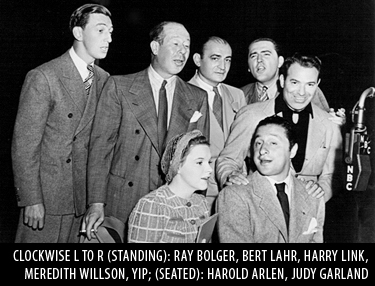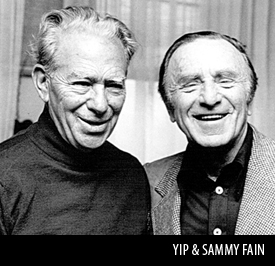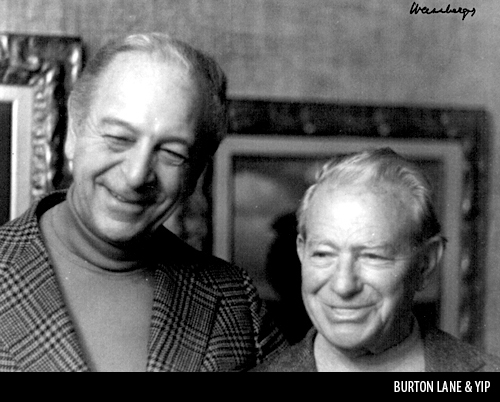E. Y. (Yip) Harburg (1896-1981), in a career spanning over fifty years, was known as “Broadway’s social conscience.” A master lyricist, poet and book writer, Yip was always dedicated to social justice. He wrote the words to over 600 songs, most notably all the lyrics in the 1939 motion picture classic “The Wizard of Oz,” including “Over the Rainbow” which was voted the Number 1 recording of the 20th century in a 2001 poll conducted by the National Endowment for the Humanities and the Recording Industry Association of America.
On Broadway Yip began writing lyrics for multiple revues in the 1930s which included songs that became standards including “Brother, Can You Spare a Dime?,” the classic anthem of the Depression (with composer Jay Gorney, 1932) and “April in Paris” (with Vernon Duke, 1932). He wrote lyrics for the satiric Life Begins at 8:40 (1934, with co-lyricist Ira Gershwin and music by Harold Arlen). He also conceived and wrote lyrics for book musicals with political and social themes, including Hooray for What! (1937, with an anti-war theme, music by Arlen) and Bloomer Girl (1944, feminist, anti-racist theme, music by Arlen). He co-wrote the book (with Fred Saidy) and wrote the lyrics for Finian’s Rainbow (1947, music by Burton Lane) which won the Henderson and George Jean Nathan Awards for Best Musical Comedy; for Flahooley (1951, music by Sammy Fain), and for Jamaica, starring Lena Horne (1957, music by Arlen). He conceived the book and wrote the lyrics for The Happiest Girl in the World (1961, a musical version of Lysistrata, music by Jacques Offenbach). His last Broadway lyrics were for Darling of the Day (1968, music by Jule Styne).
In Hollywood, Yip Harburg wrote lyrics for numerous film musicals during the 1930’s and 1940’s. His most famous work was The Wizard of Oz (1939, with Arlen). In this classic, Yip conceived the integration of song and script, wrote the recitative for the Munchkin “operetta,” and  wrote the lyrics to all the songs, including the Academy Award-winning “Over the Rainbow.”He was also the final script editor and made significant contributions to the dialogue. In 1962 he and Arlen scored the animated feature Gay Purr-ee (now a video classic featuring the voice of Judy Garland). From 1951 to 1961 during the House Un-American Activities Committee investigations and the McCarthy hearings Yip was “blacklisted” for his political views from film, television and radio. Broadway, however, remained free from this kind of censorship.
wrote the lyrics to all the songs, including the Academy Award-winning “Over the Rainbow.”He was also the final script editor and made significant contributions to the dialogue. In 1962 he and Arlen scored the animated feature Gay Purr-ee (now a video classic featuring the voice of Judy Garland). From 1951 to 1961 during the House Un-American Activities Committee investigations and the McCarthy hearings Yip was “blacklisted” for his political views from film, television and radio. Broadway, however, remained free from this kind of censorship.
Altogether, Yip wrote the lyrics to over 600 songs with a variety of composers. “It’s Only a Paper Moon” (1932, with Arlen), “Over the Rainbow” (1939, Arlen, which won the Academy Award), “We’re Off to See the Wizard,” “Ding Dong! The Witch Is Dead” and “Happiness Is Just a Thing Called Joe” (1943, Arlen, from the film Cabin in the Sky). Later, with Lane, he wrote “Old Devil Moon” and “How Are Things in Glocca Morra?” The team of Arlen and Harburg also wrote Groucho Marx’s signature song, “Lydia, the Tattooed Lady” (1939, from At the Circus). In 2006 Yip’s two volumes of satiric light verse, Rhymes for the Irreverent (1965) and At This Point in Rhyme (1976) were reissued together in one hardcover edition under the title Rhymes for the Irreverent by the Freedom from Religion Foundation in cooperation with the Yip Harburg Foundation.
 As Broadway’s social commentator, and given his ability to “gild the philosophic pill” with witticisms and a lyric style all his own, Yip Harburg is a unique and major lyricist of 20th century American musical theatre.
As Broadway’s social commentator, and given his ability to “gild the philosophic pill” with witticisms and a lyric style all his own, Yip Harburg is a unique and major lyricist of 20th century American musical theatre.
Yip Harburg died on March 5, 1981 at 84 years young.

